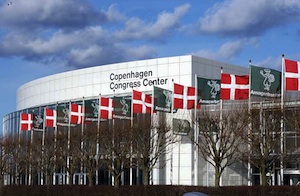Let’s get real about Copenhagen
Alexia Parks | Dec 21, 2009
Let’s get real about Copenhagen. Until now, the biggest roadblock to signing the Kyoto agreement, and to making progress at #COP15 has been the United States. Yes, China has now surpassed us as the biggest polluter on the planet, yet in part, their rapid growth has been in response to feeding our need to consume.
Now, the U.S., led by President Barack Obama, has brokered a deal — a real deal, although a very, very small deal. However, a deal is a deal. And, of course, it cannot be legally binding until the U.S. Congress says so.Given the polarized nature of today’s U.S. Congress, it would be almost impossible for them to sign any binding global agreement on climate change. So give Obama a break here. His presence did catalyze action and closure at the UN conference.
In Copenhagen, a deal has been struck. It will lead to larger and bigger actions, for two main reasons.
1. During the two week UN Conference, there was an enormous amount of networking done by observer organizations, researchers and delegates. There is now an ever expanding community of committed people around the globe who know each other by face, by name, or by organization. Avaaz.org is one organization that managed to gather more than 11 million signatures during the two week conference, in support of what they termed a REAL deal.
2. There was extraordinary media coverage. The media loves conflict and cliff-hangers. The UN conference gave them plenty of these, with a message attached. The conflict was not the kind covered in celebrity gossip, in fact, more stories were probably written about climate change over these two weeks, than about Tiger Woods. Billions of people around the world have had access to news of the dangers and perils of climate change and actions that must be taken.
Which leads me to my final point, and I’ve said it before. All climate impacts are local. Whatever governments say or do, it still comes down to individual actions that we, each one of us, takes in our everyday lives, and actions taken in the communities where we live.
To get the U.S. Congress to take its first steps toward meaningful climate protection action, we will need to sweep out old thinking and bring in new thought leaders. In 2010, we need to elect politicians who understand that climate change is a real and pending danger, and who are willing to take dramatic action to reduce U.S. emissions.
In 2007, at a similar conference in Bali, the only agreement the 193 nations were able to make was to wait until 2009, until a new president had been elected in the United States. That has happened. Now, leaders and delegates from the 193 nations in Copenhagen are waiting until 2010, until a new group of politicians are elected to the U.S. Congress.
Change happens. And we have a role to play when we go to the polls next year.
(This article also appeared in Alexia’s blog on Huffington Post.)


